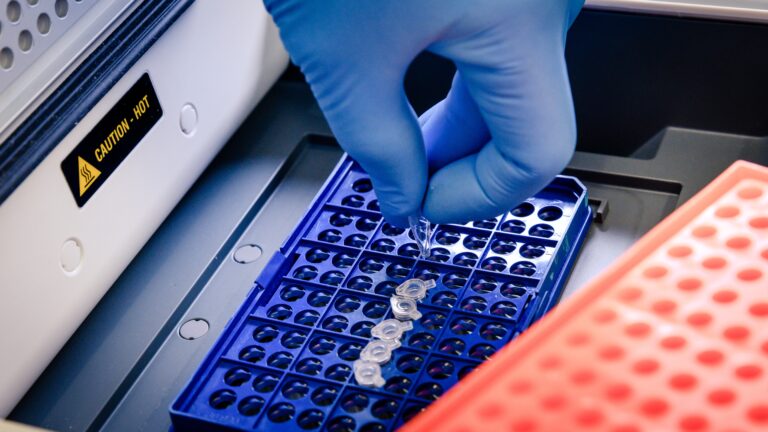Navigating the landscape of genetic testing for health can be overwhelming, but this comprehensive guide will provide all the essential information on pharmacogenomics testing kits. These kits offer personalized insights into your genetic makeup, including your risk for diseases, dietary needs, and response to medications. With the explosion of companies offering these services, it’s important to make informed decisions and choose the best pharmacogenomics testing kit for your needs.

Key Takeaways:
- Pharmacogenomics testing kits provide personalized insights into your genetic makeup.
- They can help determine your risk for diseases, dietary needs, and response to medications.
- It’s important to make informed decisions and choose the best testing kit for your needs.
- Genetic testing for health is a valuable tool in personalized medicine.
- By understanding your genetic predispositions, you can tailor your healthcare approach for optimal results.
What is Genetic Testing for Health?
Genetic testing for health is a revolutionary process that utilizes DNA analysis to provide valuable insights into an individual’s genetic makeup. By examining specific genes and genetic variations, this type of testing offers information about an individual’s risk for diseases, dietary needs, and response to medications. It allows for personalized medicine, tailoring healthcare approaches to an individual’s unique genetic profile.
Through genetic testing, individuals can gain a comprehensive understanding of their biological composition and uncover potential predispositions to certain health issues. This knowledge empowers individuals to take proactive steps, such as implementing preventive measures, implementing personalized lifestyle changes, and making informed healthcare decisions.
Images obtained through genetic testing for health can reveal important details about an individual’s DNA. These images illustrate genetic variations and mutations that are associated with increased or decreased risk for specific diseases. Understanding these genetic factors enables healthcare professionals to provide personalized recommendations and interventions, creating a more precise and effective approach to healthcare.
| Benefits of Genetic Testing for Health: | Considerations of Genetic Testing for Health: |
|---|---|
|
|
Genetic testing for health primarily focuses on analyzing an individual’s DNA to uncover potential health risks and optimize their healthcare outcomes. By leveraging advancements in genetics and molecular biology, this testing enables personalized medicine to improve individual health and well-being.
What Does Genetic Testing for Health Look For?
Genetic testing for health aims to identify variations or mutations in your genes that can indicate an increased risk for specific diseases or conditions. By analyzing your DNA, these tests provide valuable insights into your genetic makeup, allowing for personalized healthcare decisions and preventive measures.
Some of the key areas that genetic testing for health focuses on include:
- Variations in Genes: These tests examine specific regions of your DNA to identify any genetic variations or mutations that may increase your susceptibility to certain health conditions.
- Disease Risk: By analyzing your genetic markers and comparing them to known associations, these tests can predict your risk for developing diseases such as cancer, heart disease, Alzheimer’s, or diabetes.
- Carrier Status: Genetic testing can also determine whether you carry certain genes associated with hereditary conditions, providing insights into the likelihood of passing these conditions to your children.
- Pharmacogenomics: Understanding how your body processes medications is another important aspect of genetic testing for health. These tests analyze genes involved in drug metabolism, providing information on how your body may respond to different medications.
- Lifestyle Choices: Some genetic tests may even offer insights into how your genetic makeup influences your response to diet and exercise. This information can help you make personalized decisions regarding your nutritional needs and fitness routine.
By uncovering these aspects of your genetic profile, genetic testing for health empowers you to proactively manage your health and make informed choices based on your unique genetic predispositions.
Example Table:
| Genetic Testing Focus | Examples |
|---|---|
| Variations in Genes | BRCA gene mutations, hereditary cholesterol disorders |
| Disease Risk | Increased risk for breast cancer, heart disease predisposition |
| Carrier Status | Cystic fibrosis carrier status, sickle cell carrier status |
| Pharmacogenomics | Genes involved in drug metabolism and response |
| Lifestyle Choices | Genetic influences on response to diet and exercise |
Different Types of Genetic Testing for Health
Genetic testing for health is a diverse field with various types of tests available, each serving a specific purpose. These tests provide valuable insights into an individual’s genetic makeup and can help identify potential risks and inform personalized healthcare decisions.
Predictive and Pre-symptomatic Testing
Predictive and pre-symptomatic testing is designed to detect specific gene mutations associated with disorders that may manifest later in life. By identifying these genetic variations early on, individuals can take proactive measures to prevent or manage the onset of these conditions.
Diagnostic Testing
Diagnostic testing is used to confirm or rule out suspected genetic conditions in individuals showing symptoms. These tests help healthcare professionals determine the cause of a particular condition or illness and guide appropriate treatment strategies.
Carrier Testing
Carrier testing is conducted to determine if an individual carries a gene associated with a specific disorder. It is commonly performed before or during pregnancy to assess the risk of passing on genetic conditions to future generations.
Prenatal and Newborn Screening
Prenatal and newborn screening involves testing during pregnancy and after birth to identify genetic disorders in infants. These tests aim to detect conditions early, allowing for timely interventions and appropriate medical care.
Pharmacogenomic Testing
Pharmacogenomic testing focuses on understanding how an individual’s genetic makeup affects their response to medications. By analyzing genetic variations related to drug metabolism, pharmacogenomic testing helps optimize medication choices, dosage, and treatment plans for personalized healthcare.
Nutrigenomic Testing
Nutrigenomic testing explores the relationship between an individual’s genetics and their response to nutrients, diet, and lifestyle choices. These tests provide insights into how genetic variations impact metabolism, nutrient absorption, and overall dietary needs.
Ancestry Testing
Ancestry testing provides individuals with information about their genetic heritage and ancestral origins. These tests analyze DNA markers to trace lineage and identify geographical regions or ethnicities associated with an individual’s genetic makeup.
Each type of genetic testing for health serves a unique purpose and offers valuable insights into an individual’s genetic predispositions, disease risks, and personalized healthcare needs.
| Types of Genetic Testing for Health | Purpose |
|---|---|
| Predictive and Pre-symptomatic Testing | Detect gene mutations associated with future disorders |
| Diagnostic Testing | Confirm or rule out suspected genetic conditions |
| Carrier Testing | Determine if an individual carries a gene for a specific disorder |
| Prenatal and Newborn Screening | Detect genetic disorders during pregnancy and after birth |
| Pharmacogenomic Testing | Understand how genetics influence medication response |
| Nutrigenomic Testing | Explore how genetics impact response to nutrients and diet |
| Ancestry Testing | Provide information about genetic heritage and ancestry |
How Does Health Genetic Testing Work?
Health genetic testing plays a crucial role in providing individuals with valuable insights into their genetic makeup. This process involves several essential steps that help guide healthcare decisions and personalized treatment plans.
Consultation with Healthcare Provider
Before undergoing health genetic testing, it is highly recommended to consult with a healthcare provider. During this consultation, you will discuss your family history, health goals, and specific concerns. This crucial step ensures that the testing process is tailored to your individual needs and provides the most relevant information for your healthcare journey.
Sample Collection
After the initial consultation, the next step is sample collection. Depending on the type of genetic testing, samples can be collected through a blood test, saliva sample, or even other body tissues. These samples will contain your DNA, which will be analyzed in a laboratory to extract valuable genetic information.
Laboratory Analysis
Once your samples are collected, they are sent to a laboratory for analysis. Skilled professionals utilize advanced techniques and cutting-edge technology to analyze your DNA and identify specific genetic variations or mutations. This comprehensive analysis provides insights into your predisposition to certain diseases, responsiveness to medications, and other relevant genetic information.
Interpretation of Results
After the laboratory completes the analysis, a healthcare provider or genetic counselor interprets the results. They will explain the findings, addressing any concerns or questions you may have. This interpretation takes into account your genetic profile and provides important information about your health risks, potential prevention strategies, and personalized treatment options.
Follow-up Care and Recommendations
Following the interpretation of results, your healthcare provider will provide follow-up care and recommendations. These may include specific lifestyle changes, personalized treatment plans, or further screening for specific conditions. The aim is to empower you with the knowledge and insights gained from the genetic testing, enabling you to make informed decisions about your health and well-being.
Genuine Data:
| Aspect | Process |
|---|---|
| 1. Consultation with Healthcare Provider | Discuss family history, health goals, and concerns |
| 2. Sample Collection | Take blood, saliva, or tissue sample |
| 3. Laboratory Analysis | Analyze DNA for genetic variations/mutations |
| 4. Interpretation of Results | Expert interpretation of genetic findings |
| 5. Follow-up Care and Recommendations | Guidance on lifestyle changes and personalized treatments |
Risks of Health Genetic Testing
While health genetic testing provides valuable insights, it is essential to consider the potential risks and implications associated with it. Here, we explore some of the key concerns that individuals may encounter when undergoing genetic testing for health.
1. Privacy Concerns
One significant concern surrounding health genetic testing is privacy. Since genetic information is highly sensitive and personal, there is a risk of it being misused or falling into the wrong hands. It is crucial to choose reputable testing providers and understand their privacy policies to ensure the confidentiality of your genetic data.
2. Emotional Impact
Learning about one’s risk for certain diseases through genetic testing can have a profound emotional impact. Some individuals may experience anxiety, fear, or uncertainty after receiving their test results. In such cases, seeking support from mental health professionals or genetic counselors can greatly assist in processing and managing these emotions.
3. Inaccurate Results
Although rare, inaccurate genetic testing results can occur. False positives or false negatives may lead to unnecessary stress or medical interventions. It is crucial to select reliable testing providers and consult with healthcare professionals to ensure the accuracy and interpretation of your genetic test results.
4. Family Implications
Genetic testing can reveal carrier status for hereditary diseases, which can have implications for family members. Discovering that you carry a disease-causing variant could mean that your relatives may also be at risk. It’s important to consider how this information may impact family dynamics and make informed decisions about sharing such results with your loved ones.
5. Insurance Considerations
Genetic test results may have implications for insurance coverage or employment. Some individuals may have concerns that their results could affect their ability to obtain insurance or may face discrimination based on their genetic information. Understanding the legal and insurance aspects related to genetic testing is crucial before making testing decisions.
It is essential to weigh these risks against the potential benefits of health genetic testing. Keeping in mind the safeguards and support available, individuals can make informed decisions and take appropriate steps to maximize the advantages while minimizing the associated risks.
What Can You Do After Getting Your Results?
Once you have received your health genetic testing results, there are several important steps you can take to effectively navigate the information and make informed decisions about your healthcare. Consulting with professionals, such as your healthcare provider or a genetic counselor, can provide valuable insights and help you fully understand the results and their implications.
Based on the findings of the genetic testing, you can make personalized healthcare decisions that align with your genetic makeup. This may involve making lifestyle changes, such as modifying your diet or exercise routine, to optimize your health and well-being. Additionally, the results may prompt you to seek specialized medical care or screenings for specific conditions.
Furthermore, if the genetic testing results have implications for your family members, it is important to communicate this information to them. Encourage your family members to consider genetic testing as well, as it can provide them with valuable insights into their own health risks and preventative measures they can take.
It is also crucial to evaluate the insurance and legal aspects related to your genetic information. Different regions and jurisdictions have varying laws and regulations governing genetic testing and privacy. Take the time to familiarize yourself with these considerations to ensure that your genetic information is protected and used appropriately.
Ongoing monitoring and care may be necessary depending on the specific findings of the genetic testing. Regular follow-up consultations with healthcare professionals can help address any potential health issues related to the genetic findings and ensure proactive management of your health.

Key Actions After Receiving Your Health Genetic Testing Results:
- Consult with healthcare professionals: Schedule an appointment with your healthcare provider or a genetic counselor to fully understand the results and their implications.
- Make informed healthcare decisions: Based on the results, make personalized decisions about lifestyle changes, specialized medical care, or screenings for specific conditions.
- Communicate with family members: Share the genetic testing information and encourage your family members to consider testing as well.
- Evaluate insurance and legal aspects: Familiarize yourself with the insurance coverage and legal considerations related to genetic information in your region.
- Engage in ongoing monitoring and care: Regularly follow up with healthcare professionals for proactive management and addressing potential health issues revealed by the genetic testing.
By taking these important steps, you can proactively utilize your health genetic testing results to shape your healthcare decisions, optimize your well-being, and make informed choices for both yourself and your family.
Accuracy of Health Genetic Testing
When it comes to health genetic testing, accuracy is of utmost importance. The reliability of the tests heavily relies on the proficiency and expertise of the company or medical professional conducting the testing. Reputable companies and healthcare providers adhere to strict quality control measures, ensuring that the results are accurate and trustworthy.
Choosing a reputable company or consulting with a trusted medical professional is crucial to obtaining accurate genetic testing results. These professionals have the necessary knowledge and experience to perform the tests accurately and interpret the results correctly. They follow standardized protocols and utilize advanced technology to minimize the chances of errors or discrepancies in the testing process.
Genetic testing accuracy plays a vital role in providing individuals with reliable information about their health risks, potential genetic conditions, and personalized treatment options. By relying on reputable companies and medical professionals, individuals can confidently make important decisions about their healthcare and take appropriate actions based on the test results.
“Accurate genetic testing is the cornerstone of personalized medicine, enabling tailored treatments and interventions. Reputable companies and trusted medical professionals ensure the reliability of results, empowering individuals to make informed healthcare decisions.”
Additionally, accurate genetic testing is crucial for the field of research and advancements in genomics. High-quality data obtained from reliable testing ensures the validity of scientific studies and helps healthcare professionals gain a deeper understanding of various genetic conditions and their impact on personalized medicine.
Overall, the accuracy of health genetic testing relies on the expertise of reputable companies and knowledgeable medical professionals. By choosing the right professionals and institutions, individuals can trust the accuracy and reliability of their genetic testing results, enabling them to make informed healthcare decisions and take proactive steps towards their well-being.
| Benefits of Accurate Genetic Testing | Considerations for Choosing Reputable Companies |
|---|---|
|
|
Stakeholders Involved in Clinical PGx Design and Implementation Process
The successful implementation of clinical pharmacogenomics (PGx) involves multiple stakeholders working collaboratively towards a common goal. These stakeholders include regulatory bodies, hospital leadership, the pharmacy and therapeutics committee, the molecular laboratory, as well as the information technology department.
Regulatory bodies, such as the FDA and EMA, play a crucial role in authorizing and recommending specific PGx tests. Their expertise ensures that the tests meet the required standards and provide accurate and reliable results.
Hospital leadership, including administrators and executives, plays a vital role in supporting and facilitating the PGx design and implementation process. As advocates for personalized medicine, they communicate with payers to ensure the availability of necessary resources and funding.
The pharmacy and therapeutics committee, comprised of healthcare professionals and experts in pharmacology, collaborates closely with the molecular laboratory and the information technology department to spearhead the implementation of PGx in the hospital. Together, they develop protocols, guidelines, and workflows to ensure seamless integration of PGx into clinical practice.
The molecular laboratory is responsible for conducting the necessary genetic testing and analysis to generate accurate and reliable PGx results. They work closely with the pharmacy and therapeutics committee to align testing methodologies and ensure quality control standards are met.
The information technology department plays a crucial role in implementing the necessary infrastructure for data management, storage, and integration of PGx results into the electronic health records system. They ensure the secure and efficient exchange of information between healthcare providers and patients.
Furthermore, healthcare providers and patients are integral stakeholders in the PGx design and implementation process. Healthcare providers utilize the PGx results to make more informed treatment decisions, maximizing therapeutic efficacy and minimizing adverse drug reactions. Patients benefit from personalized medicine approaches tailored to their genetic profiles, leading to improved healthcare outcomes.
Overall, the involvement and collaboration of these stakeholders are essential for the successful design and implementation of PGx in a clinical setting.
The Role of Each Stakeholder:
| Stakeholder | Responsibilities |
|---|---|
| Regulatory bodies (FDA, EMA) | Authorization and recommendation of PGx tests |
| Hospital leadership | Support, communication with payers |
| Pharmacy and therapeutics committee | Collaboration with molecular laboratory and information technology department, developing protocols, guidelines, and workflows |
| Molecular laboratory | Conduct genetic testing, analysis, and quality control |
| Information technology department | Implement infrastructure for data management and integration |
| Healthcare providers | Utilize PGx results for treatment decisions |
| Patients | Benefit from personalized medicine approaches |
Developing and Applying PGx in Hospital Clinical Practice
Developing and applying pharmacogenomics (PGx) in a hospital clinical practice involves several crucial steps that ensure the successful integration of PGx testing into the healthcare workflow. This section will explore each step in detail, highlighting the importance of evidence evaluation, drug selection, integration into the healthcare workflow, test reimbursement, and the utilization of PGx resources.
Evidence Evaluation
One of the initial steps in implementing PGx in a hospital setting is the thorough evaluation of available evidence. The pharmacy and therapeutics committee, comprised of healthcare professionals with relevant expertise, carefully examines the research and clinical studies supporting the effectiveness and benefits of PGx testing. This evaluation process ensures that only the most credible and useful information is used as the foundation for decision-making.
Drug Selection
Based on the evidence evaluation, the pharmacy and therapeutics committee selects the most relevant drugs for PGx testing. This involves identifying medications where genetic variations significantly impact efficacy or pose a higher risk of adverse drug reactions. By focusing on these medications, healthcare providers can make more informed prescribing decisions, improving patient outcomes.
Integration into Healthcare Workflow
The successful integration of PGx testing into the healthcare workflow is essential for its widespread adoption and usability. This process involves collaboration between different hospital departments such as laboratory services, pharmacy services, and information technology. A streamlined workflow ensures that PGx testing can be easily ordered, conducted, and interpreted, allowing healthcare providers to incorporate PGx information seamlessly into patient care.
Test Reimbursement
Test reimbursement is a critical consideration in implementing PGx in a hospital clinical practice. It ensures that patients have affordable access to PGx testing, promoting equitable healthcare delivery. The pharmacy and therapeutics committee, in collaboration with hospital administrators, works towards securing adequate reimbursement for PGx testing, ensuring its accessibility for all eligible patients.
PGx Resources
A wide range of PGx resources, such as guidelines, educational materials, and implementation programs, are available to support the development and application of PGx in hospital settings. These resources provide healthcare professionals with up-to-date information, best practices, and expert guidance, facilitating the successful integration of PGx testing into clinical practice. Leveraging these resources enhances the knowledge and competence of healthcare providers, ultimately leading to improved patient care and outcomes.
Summary of Steps for Developing and Applying PGx in Hospital Clinical Practice
| Steps | Description |
|---|---|
| Evidence Evaluation | Thoroughly evaluate available evidence on PGx testing to ensure credibility and utility. |
| Drug Selection | Select medications where genetic variations significantly impact efficacy or pose a higher risk of adverse drug reactions. |
| Integration into Healthcare Workflow | Collaborate with different hospital departments to create a streamlined workflow for ordering, conducting, and interpreting PGx tests. |
| Test Reimbursement | Secure adequate reimbursement for PGx testing to ensure affordability and accessibility for patients. |
| PGx Resources | Utilize available guidelines, educational materials, and implementation programs to support the development and application of PGx in clinical practice. |
Conclusion
Pharmacogenomics testing kits offer a revolutionary approach to personalized medicine by providing invaluable insights into your genetic makeup. By understanding your unique genetic predispositions and how your body responds to medications, you can make informed decisions that can significantly impact your health.
This comprehensive guide has explored the world of pharmacogenomics testing kits, equipping you with the knowledge to navigate this rapidly evolving field. Armed with this information, you can take control of your health journey and work closely with healthcare professionals to develop a personalized healthcare approach.
Genetic testing for health has the potential to revolutionize healthcare, offering personalized insights that were previously inaccessible. By leveraging the power of pharmacogenomics testing kits, you can maximize the benefits of personalized medicine and make proactive choices that align with your unique genetic profile.
FAQ
What is genetic testing for health?
Genetic testing for health examines your DNA to provide information about your risk for diseases, dietary needs, and response to medications. It delves into your genetic makeup, providing a detailed overview of your biological composition.
What does genetic testing for health look for?
Genetic testing for health looks for variations or mutations in your genes that can indicate a higher risk for specific diseases or conditions. It can also determine your carrier status for hereditary conditions and assess how your body processes medications (pharmacogenomics). Some tests may even offer insights into how your genetics influence your response to diet and exercise, helping you make personalized health and wellness decisions.
What are the different types of genetic testing for health?
There are several different types of genetic testing for health, including predictive and pre-symptomatic testing, diagnostic testing, carrier testing, prenatal and newborn screening, pharmacogenomic testing, nutrigenomic testing, and ancestry testing.
How does health genetic testing work?
Health genetic testing typically begins with a consultation with a healthcare provider to discuss your family history, health goals, and concerns. Sample collection is the next step, which can be done through a blood test, saliva sample, or other body tissues. The collected sample is then sent to a laboratory for DNA analysis. Once the results are obtained, a healthcare provider or genetic counselor interprets the findings and provides recommendations or preventive measures based on the results.
What are the risks of health genetic testing?
Health genetic testing carries certain risks, including privacy concerns, emotional impact, potential for inaccurate results, family implications, and concerns about insurance coverage or employment.
What can I do after getting my health genetic testing results?
After receiving your health genetic testing results, you can consult with healthcare professionals to fully understand the results and their implications. Based on the results, you can make informed healthcare decisions, communicate information to family members, evaluate insurance and legal aspects, and consider ongoing monitoring and care for potential health issues related to the genetic findings.
How accurate is health genetic testing?
The accuracy of health genetic testing depends on the company or medical professional conducting the testing. Reputable companies and healthcare providers follow stringent quality control measures to ensure accurate and reliable results.
Who are the stakeholders involved in the clinical PGx design and implementation process?
The stakeholders involved in the clinical pharmacogenomics (PGx) design and implementation process include regulatory bodies like the FDA and EMA, hospital leadership, the pharmacy and therapeutics committee, the molecular laboratory, and the information technology department.
How is PGx developed and applied in hospital clinical practice?
Developing and applying pharmacogenomics (PGx) in hospital clinical practice involves evaluating available evidence, selecting relevant drugs, integrating PGx testing into the healthcare workflow, considering test reimbursement, and utilizing PGx resources for guidance and implementation.
What are the best pharmacogenomics testing kits of 2024?
Please refer to our comprehensive guide to exploring the best pharmacogenomics testing kits of 2024 for detailed information on the top kits currently available in the market.





